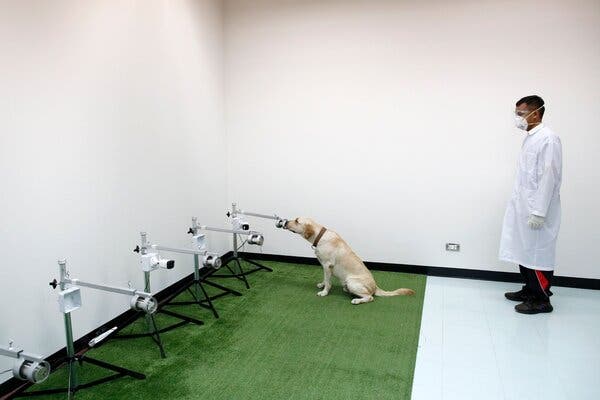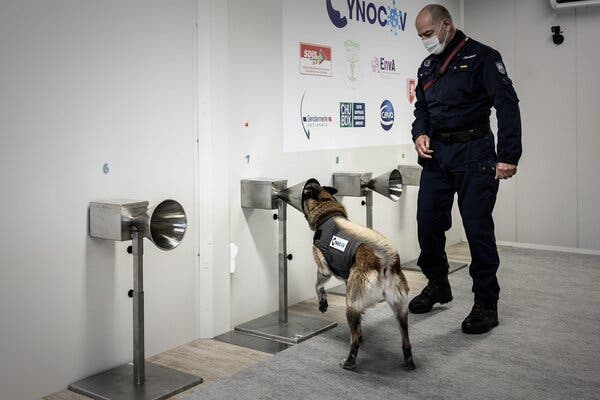Advertisement
Supported by
Covid-Sniffing Dogs Are Accurate but Face Hurdles for Widespread Use
Logistics, cost and official standards are needed for the dogs to fulfill their potential in medical fields.

Dog noses are great Covid-19 detectors, according to numerous laboratory studies, and Covid sniffing dogs have already started working in airports in other countries and at a few events in the United States, like a Miami Heat basketball game.
But some experts in public health and in training scent dogs say that more information and planning are needed to be certain they are accurate in real life situations.
“There are no national standards” for scent dogs, according to Cynthia M. Otto, director of the Penn Vet Working Dog Center at the University of Pennsylvania School of Veterinary Medicine and one of the authors of a new paper on scent dog use in Covid detection.
And although private groups certify drug-sniffing and bomb and rescue dogs, similar programs for medical detection do not exist, according to the new paper in the journal Disaster Medicine and Public Health Preparedness.
Lois Privor-Dumm, a public health researcher at Johns Hopkins University and the senior author of the paper, said there was no question that dogs have great potential in medical fields. But she wants to explore how they could be deployed on a large scale, such as by the government.
“What are all the ethical considerations? What are the regulatory considerations? How practical is this?” she asked. Not only the quality of detection but logistics and cost would be central to any widespread application, as with any public health intervention.
Quality control is a first step, and a large one. Medical scent detection is more complicated than drug or bomb detection, Dr. Otto said. A dog working an airport for drugs or explosive detection has a consistent context and a fairly straightforward target odor. In Covid detection, researchers know that the dogs can distinguish an infected person’s sweat or urine. But they don’t know what chemicals the dog is identifying.
Because human scents vary, medical detection dogs have to be trained on many different people. “We have all of the ethnicities and ages and diets and all of these things that make human smell,” Dr. Otto said.
The symptoms of many medical conditions are similar to those of Covid, and dogs that detect scents associated with fever or pneumonia would be ineffective. So the human subjects used in training dogs, Dr. Otto said, must include “lots of people that are negative, but might have a cough or might have a fever or other things.” If the dogs mistook flu for Covid, that would obviously be a crucial mistake.

Also, dogs can be trained on sweat, or saliva or urine. In the United Arab Emirates, the dogs worked with urine samples. In Miami, they just walked along a line of people.
Any positive cases of Covid infection that the dogs detect are usually confirmed with what is now the gold standard for confirming the presence of the coronavirus, a P.C.R. test. A review of research published last week concluded, however, that dogs performed better than the test.
But these are experimental results. Dogs do well in detecting explosives and other substances at a distance, but so far Dr. Otto said she was not aware of published research attesting to the accuracy of dogs sniffing people in a line rather than urine or sweat.
If the government were to conduct or approve dogs for Covid detection in an official way, some standards would have to be established on how dogs should be trained and how their performance should be evaluated. Dr. Otto is on a committee at the National Institute of Standards and Technology now meeting to develop standards for scent detection dogs in a variety of situations, including detection of Covid.
She said that even if standards are clearly set, finding enough dogs to conduct widespread scent detection is another hurdle. Trained dogs are not easy to come by. “We have a shortage of dogs in this country for bomb detection. We’ve been dealing with that for years,” she said.
Dogs can be retrained from one scent to another, but that itself can be tricky. “Some countries are actually taking their dogs that are trained on bombs and training them on Covid. But you know, all you have to do is think about at an airport, if you have a dog that sniffs both Covid and bombs and they alert, what do you have?”
Well-trained dogs are also costly and require paid, well-trained human handlers. According to the report, dogs may cost $ 10,000 and scent training per dog is $ 16,000. The Transportation Security Administration, for example, has a $ 12 million training facility in San Antonio for explosive detection dogs and handlers, and estimates the training cost for dogs and handlers at $ 33,000 for explosive detection and $ 46,000 for passenger screening.
All these issues will determine how dogs are used in the future. Their ability is a given. “I think they absolutely can do it,” Dr. Otto said. “It’s just how we implement them.”
Advertisement

